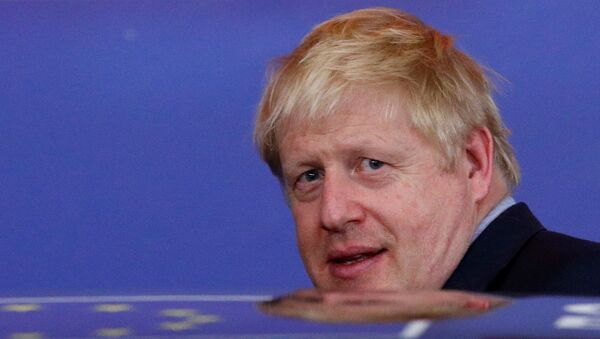Boris Johnson has published his 110-page Brexit Withdrawal Bill, with another 124 pages of explanatory notes, just hours before MPs are scheduled to discuss it at a “meaningful” Commons debate that will kick off on “Titanic Tuesday", as it's been dubbed in Parliament, the British press reported. The move closely followed Commons Speaker Bercow blocking a vote, saying this should happen only after the initiative is formally introduced.
When publishing the Bill, the prime minister expressed a determination to speed up the domestic negotiations and push his Brexit deal through the Commons in the next three days all in a bid to avoid another delay and take Britain out of the EU, as promised, by 31 October.
MPs are to start debating the document’s provisions on Tuesday afternoon, with 12 hours given to them to digest the details of the proposed landmark constitutional changes. The talks are due to continue until Thursday, while the first vote on the Bill is scheduled for around 7 p.m. on Tuesday evening.
The fast-track timetable leaves no room or time for proper discussions, according to the opposition. If the framework that sees talks finalise on Thursday is rejected, Brexit is not expected to happen as scheduled, on 31 October.
The debate is, meanwhile, due to reach its climax on Wednesday, when the Commons will hold a marathon 12-hour debate until 1 a.m.
The talks will cover proposed amendments, are expected to include a demand for a second referendum, and membership in the EU's customs union.
Boris Johnson’s Bill overrides the necessity for another “meaningful vote” chewed over by Brexiteers since the first one was blocked on Saturday, triggering the so-called Benn Act.
Highlights of the Bill
Per the explanatory notes, the Bill is intended to “implement, and make other provision in connection with, the agreement between the United Kingdom and the EU” over Brexit, which means it gives Johnson’s deal legal status.
Transition Period
The Brexit proceedings are due to last until the end of 2020, while the deadline could possibly be extended by EU negotiators and Downing Street for up to two more years. Such an extension would require the approval of Parliament, but the Bill doesn’t entitle MPs to seek an extension themselves, meaning that whatever issues arise along the way, Parliament is not expected to tackle them of its own initiative.
Rapid and Swift
Although international treaties like WAB, must be before Parliament for at least 21 sitting days in order to get ratified, in line with the Constitutional Reform and Governance Act (Crag) of 2010, on this occasion this provision has been lifted to allow the Halloween deadline to be met.
Citizens’ Rights Come First
The Bill lays out the rights of EU nationals, and others from EEA and Efta countries, as well as the Swiss. Among the new provisions there is one that presupposes a new body be set up - one called the Independent Monitoring Authority, or IMA, for EU nationals to lodge complaints if they are unfairly treated by the government.
Labourists, Rejoice: There is a Part on Workers’ Rights
In an attempt to lure Labour rebels into backing his deal, Johnson outlined at length the already-existing principle that rights which are stipulated by EU law, such as the working time directive, will still apply in the UK. However, the Bill goes on to make a somewhat vague statement of “non-regression”, arguing that the stance on workers’ rights at the end of the transition period will not be changed, let alone reduced.
Northern Ireland Debacle
Quite a few paragraphs in the Bill outline new principles vis-a-vis Northern Ireland and the concession made by Johnson so that EU customs norms would still apply to it, a move which arguably won him the deal, but lost him the support of the DUP, and thus his party’s majority in Parliament. The explanatory notes say the Bill “provides arrangements that ensure that the UK (including Northern Ireland) does not remain in a customs union with the European Union”.
It is yet to be seen how the two principles will be applied in actuality.
Divisive Financing
“Any sum that is required to be paid to the EU or an EU entity to meet any obligation that the United Kingdom has by virtue of the withdrawal agreement is to be charged on and paid out of the consolidated fund or, if the Treasury so decides, the national loans fund", the Bill states.
Copy-Pasted EU Law?
The Bill arguably allows for EU law to be retained under UK law, as needed, even at the end of the transition period.
On Monday, UK House of Commons Speaker John Bercow blocked a new vote on the recently renegotiated Brexit deal in the British Parliament, suggesting that the Cabinet should instead try to present the legislation required for the UK to leave the EU under the deal to the Parliament. Bercow argued that the government has had "every opportunity" to have Brexit its projected way until the 31 October deadline.




